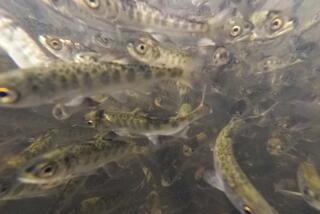Brown law signing flurry includes shark fin ban
Gov. Jerry Brown raised the ire of bicyclists, Chinese-food chefs, Republicans and some pet lovers Friday as he announced action on dozens of proposed laws.
Brown outlawed the sale of shark fins, despite protests from some Chinese American leaders who saw the move as an assault on Asian culture; vetoed a controversial bid to restrict how motorists pass bicyclists; and decided not to require microchip tracking of some dogs and cats.
Among the 57 bills he approved were several intended to increase the safety of natural gas pipelines and one that requires all ballot initiatives to be decided in November general elections, which typically draw greater numbers of liberal voters than June primaries.
The pipeline legislation followed a gas explosion last year in San Bruno, in the Bay Area, that left eight people dead. The measures improve maintenance and oversight of the pipelines, require automatic shut-off valves in vulnerable areas, ensure that gas companies pressure-test transmission lines and enhance coordination between agencies that respond to such accidents.
Those issues have all been raised by safety experts since the catastrophe occurred on Sept. 9, 2010.
“Pipeline operators and the Public Utilities Commission must take every possible step to keep it from happening again,” Brown said.
Those bills are SB 44 by state Sen. Ellen Corbett (D-San Leandro); SB 705 by Sen. Mark Leno (D-San Francisco), SB 216 by Sen. Leland Yee (D-San Francisco), SB 879 by Sen. Alex Padilla (D-Pacoima) and AB 56 by Assemblyman Jerry Hill (D-San Mateo).
The ban on shark fins, a key ingredient of a traditional soup, divided Chinese Americans. Assemblyman Paul Fong (D-Cupertino) introduced it to stop what he called a brutal practice that is wiping out large numbers of sharks. The governor agreed.
“The practice of cutting the fins off of living sharks and dumping them back in the ocean is not only cruel, but it harms the health of our oceans,” Brown said in a statement after signing the bill, AB 376.
Supporters said the harvest threatens the existence of some species. The governor said he signed the bill “in the interest of future generations.”
Many Chinese restaurant owners stood with lawmakers who voted against the legislation. State Sen. Yee labeled the bill “an unfair attack on Asian culture and cuisine.”
Brown signed a companion measure by Fong, AB 853, that allows stores to sell existing stocks of shark fins until July 1, 2013.
The governor listened to safety concerns by the California Highway Patrol in deciding to reject legislation that would have required motorists to put at least three feet of space between them and bicyclists they pass, or slow their vehicles to 15 miles per hour.
Supporters of the measure, including Los Angeles Mayor Antonio Villaraigosa and seven-time Tour de France cycling champion Lance Armstrong, said it was needed to reduce the number of bicyclists killed or injured by cars in California each year.
The governor said the CHP, as well as Caltrans, had raised “legitimate concerns” about the requirement to slow down.
“On streets with speed limits of 35 to 40 mph, slowing to 15 mph to pass a bicycle could cause rear-end collisions,” Brown wrote in his veto message. “On other roads, a bicycle may travel at or near 15 mph, creating a long line of cars behind the cyclist.”
State Sen. Alan Lowenthal (D-Long Beach) said the governor erred in dismissing his bill, SB 910. “I think his veto makes bicycling less safe,” the senator said.
Brown also wielded his veto pen on a proposal that dogs and cats from California animal shelters have microchips implanted to make it easier to reunite them with owners. Data-bearing microchips the size of a grain of rice are routinely implanted just beneath the skin of many animals, allowing information identifying the owner to be retrieved by an electronic scanner.
“Under current law, local agencies and shelters can — and should — require animals to be microchipped before being released,” Brown wrote in his veto message. “There is no need for state law to mandate the procedure, which would then require the state to pay for it.”
Sen. Ted Lieu (D-Torrance) had said his legislation would save taxpayers millions of dollars, noting that California shelters impound more than a million dogs and cats a year and euthanize about half of them, many because their owners are not found.
“Sadly, this heartbreaking trend will continue,” Lieu said.
Another contentious bill enacted Friday was the one barring ballot initiatives from primary elections. Any measure that qualifies for the ballot after July 1 of this year must be decided in the next general election, according to the measure, SB 202, by Sen. Loni Hancock (D-Berkeley).
The governor defended his position, citing figures showing that more voters participate in general elections than primaries. “The idea of direct democracy is to involve as many voters as possible,” he said in his signing message.
Republicans were furious.
“Arrogant political acts like this,” said Assemblyman Martin Garrick (R-Carlsbad), “continue to poison the environment for cooperation in Sacramento.”
Times staff writer Anthony York contributed to this report.
More to Read
Start your day right
Sign up for Essential California for news, features and recommendations from the L.A. Times and beyond in your inbox six days a week.
You may occasionally receive promotional content from the Los Angeles Times.







